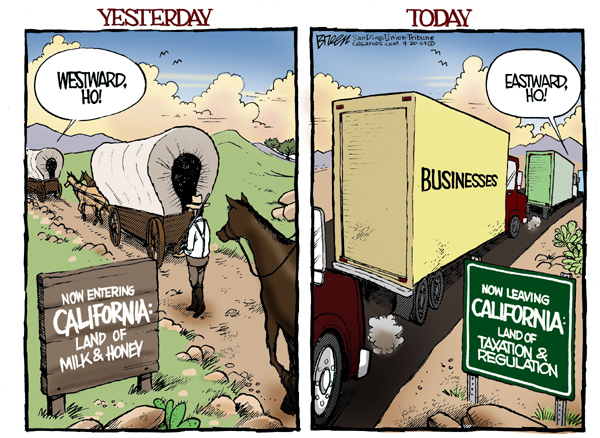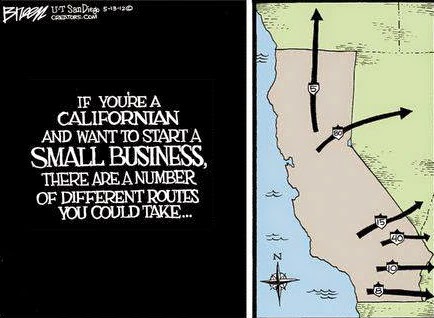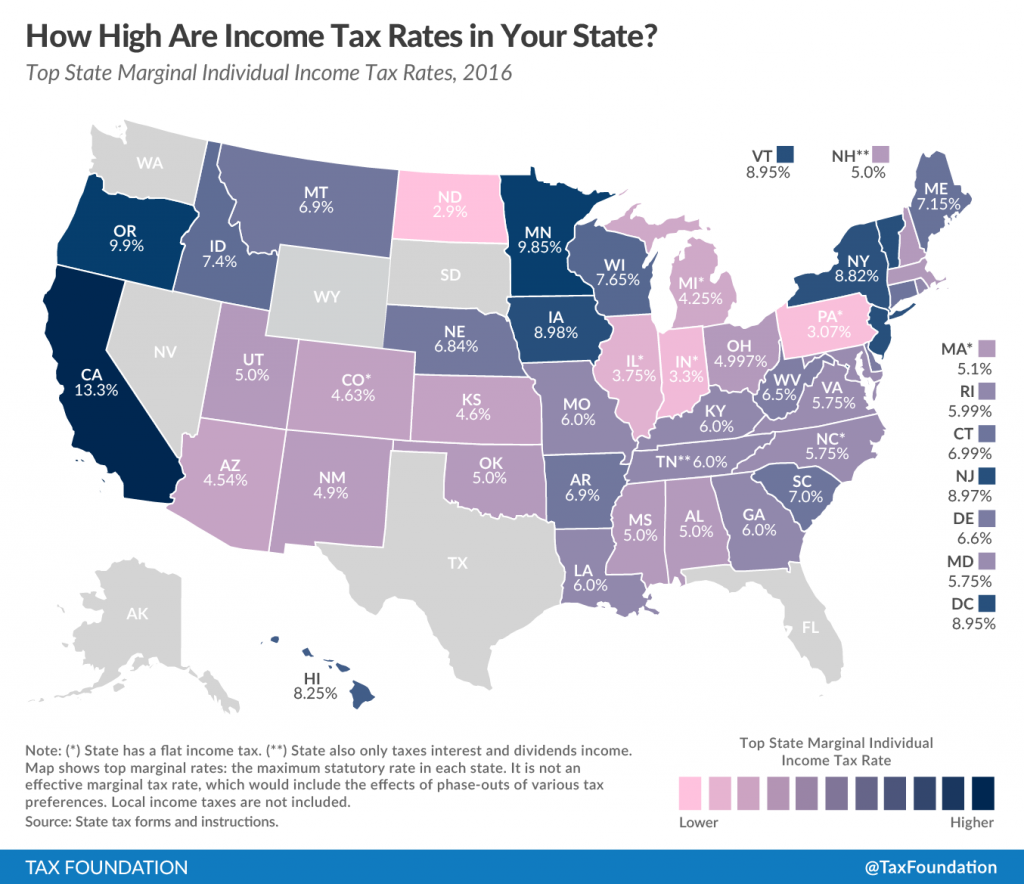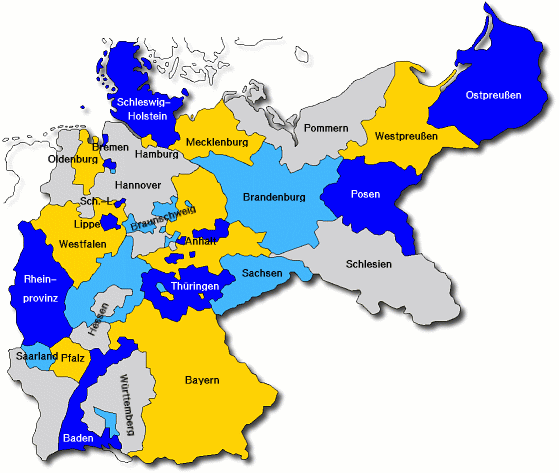Summary:
Goodbye, Socialist Paradise
Nestle USA has announced that it will move its headquarters from Glendale, California, to Rosslyn, Virginia, taking with it about 1200 jobs. The once Golden State has lost some 1690 businesses since 2008 and a net outflow of a million of mostly middle-class people from the state from 2004 to 2013 due to its onerous tax rates, the oppressive regulatory burden, and the genuine kookiness which pervades among its ruling elites.*
There has been a remarkable reversal of flow of people and businesses – but California’s ruling elite seemingly remains utterly clueless as to why this is happening and/or doesn’t seem to care. When people and businesses flee from such a well-developed region with such a favorable climate, one should realize that something is probably very wrong. Here is a link to a comprehensive study of the flight of businesses and a million middle class people (net) since 2008 (PDF).
Topics:
Antonius Aquinas considers the following as important:
Debt and the Fallacies of Paper Money,
Featured,
newslettersent,
On Politics
This could be interesting, too:
Nachrichten Ticker - www.finanzen.ch writes Die Performance der Kryptowährungen in KW 9: Das hat sich bei Bitcoin, Ether & Co. getan
Nachrichten Ticker - www.finanzen.ch writes Wer verbirgt sich hinter der Ethereum-Technologie?
Marc Chandler writes March 2025 Monthly
Mark Thornton writes Is Amazon a Union-Busting Leviathan?
Goodbye, Socialist Paradise
Nestle USA has announced that it will move its headquarters from Glendale, California, to Rosslyn, Virginia, taking with it about 1200 jobs. The once Golden State has lost some 1690 businesses since 2008 and a net outflow of a million of mostly middle-class people from the state from 2004 to 2013 due to its onerous tax rates, the oppressive regulatory burden, and the genuine kookiness which pervades among its ruling elites.* |
 There has been a remarkable reversal of flow of people and businesses – but California’s ruling elite seemingly remains utterly clueless as to why this is happening and/or doesn’t seem to care. When people and businesses flee from such a well-developed region with such a favorable climate, one should realize that something is probably very wrong. Here is a link to a comprehensive study of the flight of businesses and a million middle class people (net) since 2008 (PDF). - Click to enlarge |
| A clueless Glendale official is apparently unconcerned about the financial repercussions of Nestle’s departure saying that it was “no big deal” and saw it as an “opportunity,” whatever that means!
The stampede of businesses out of what was once the most productive and attractive region in all of North America demonstrates again that prosperity and individual freedom are best served in a political environment of decentralization.
That the individual states of America have retained some sovereignty, despite the highly centralized “federal” system of government of which they are a part, has enabled individuals and entrepreneurs living in jurisdictions that have become too tyrannical to “escape” to political environments which are less oppressive. |
 The routes people aspiring to become small businessmen in California can take…. - Click to enlarge |
| This, among other reasons (mainly air conditioning), led to the rise of the Sun Belt as people sought to escape the high taxes and regulations of the Northeast to less burdensome (and warmer!) southern destinations.
This can also be seen on a worldwide scale. The US, for a long time, had been a haven of laissez-faire economic philosophy, which, not surprisingly, became a magnet for those seeking opportunity and a higher standard of living.
No longer is this the case as increasing numbers of companies and individuals are seeking to avoid American confiscatory tax and regulatory burdens and move “offshore” or expatriate to more favorable economic climates. |
State Taxes 2016 state income taxes – to this one must add a more than 8% sales tax in California, all of which comes on top of federal taxes, plus onerous regulations and extremely litigation-happy “activists”. The only area in which California’s citizens got lucky (via referendum) are property taxes. On the other hand, the state has become extremely real estate bubble-prone, and low property taxes are probably not offsetting the drawbacks of the enormous, malignant housing boom-bust cycles the population centers are experiencing - Click to enlarge |
Decentralization – the Key to Liberty and Progress
The idea of political decentralization as a catalyst for economic growth has become a part of a “school of thought” in the interpretation of how Europe became so prosperous compared to other civilizations.
After the fall of the Roman Empire, Europe for centuries was divided politically among numerous jurisdictions and ruling authorities with no dominant central state on the Continent.
The multitude of governing bodies kept in check, to a large degree, the level of taxation and regulation. If one state became too draconian, it would lose population to less oppressive regimes.
Just as important, Europe’s governing system was aristocratic and monarchical which has proven to be far more conducive for economic growth than democracies.
While the economic oppressed can escape among the various states, there is no avoidance from the wrath of the federal government unless through expatriation and that option has become less viable with those leaving still subject to tax obligations. This, fundamentally, is the crux of the problem and has been since the ratification of the US Constitution in 1789.
The chance that a totalitarian state such as California or the Leviathan on the Potomac would actually reform themselves or relinquish power through legislative means is a mirage. Nor will revolution work as revolutionaries while appearing altruistic, typically get a hold of the machinery of government to plunder society for their own self interest on a far grander scale than the supposed despots which they replaced! |
Germany in 1871 Germany shortly before its unification in 1871 – a patchwork of competing small states. Note that this was well after an initial wave of consolidation and centralization – a century earlier, Germany actually consisted of more than 370 independent territories! We previously discussed why highly decentralized polities are the best possible political dispensation for the common man and how extremely conducive they are to liberty and the progress of civilization in this brief missive on secession.
Map via genealogy.net - Click to enlarge |
| The only viable option for the productive members of society to seek redress of state oppression is to argue, work, and eventually fight for political secession and the fragmentation of states as much as possible.
Decentralization is the only hope for those opposed to the modern, omnipotent nation state. Moreover, any notion or effort to salvage the current centralized political system must be abandoned. |
 After Donald Trump’s election, many on the political left in California have begun to talk about secession – normally an idea libertarians (and some conservatives) are more likely to be sympathetic to. One thing the presidential election showed quite clearly was that regardless of the winner, about half of the US population was always going to be deeply unhappy about the outcome. In a patchwork of numerous completely independent territories, people would be free to move to whatever area had the political dispensation they preferred. We confidently predict that socialist experiments would be few and far between if they had to depend entirely on voluntary participants. It should be no surprise that Europe’s socialists are all in favor of centralization and “harmonization” (the latter is new-speak for “let’s introduce the most onerous taxes and regulations everywhere, then no-one can escape our clutches”). - Click to enlarge |
Conclusion – The Ideological Battle Comes First
Naturally, before the breakup of the nation state can become a reality, the ideological case for political decentralization must be made. Public opinion must be convinced of the superiority of a world consisting of many states. Such a cause, however, will be considerably difficult after generations have been raised and made dependent upon social democracy.
When Nestle and other oppressed businesses and individuals can easily escape the clutches of totalitarian entities like California and, more importantly, the most dangerous government on the face of the earth for freer destinations, then will individual liberty and economic growth be assured.
References:
*Terry Jones, “Another Big Company Departs California – Will Last One to Leave Shut the Lights?” Investor’s Business Daily. February 3, 2017.
Chart by: Tax Foundation
Chart and image captions by PT
Tags:
Featured,
newslettersent,
On Politics





